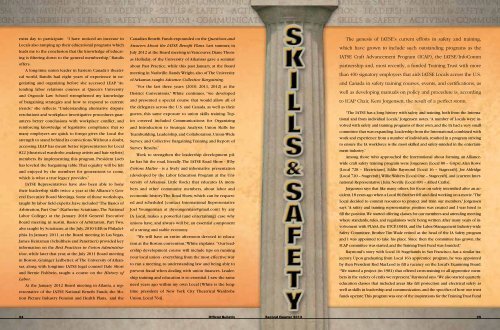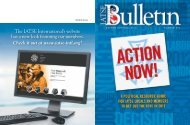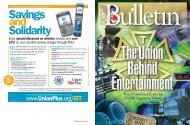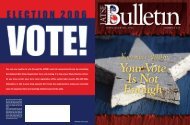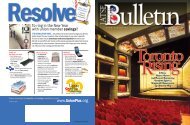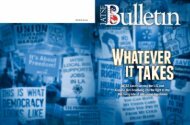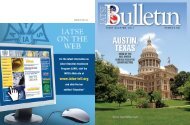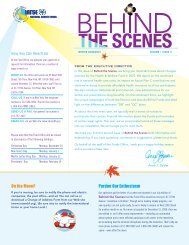Bulletin - IATSE Local 8 Philadelphia
Bulletin - IATSE Local 8 Philadelphia
Bulletin - IATSE Local 8 Philadelphia
- No tags were found...
Create successful ePaper yourself
Turn your PDF publications into a flip-book with our unique Google optimized e-Paper software.
extra day to participate. “I have noticed an increase in<strong>Local</strong>s also ramping up their educational programs whichleads me to the conclusion that the knowledge of educatingis filtering down to the general membership,” Batulisoffers.A long-time union leader in Eastern Canada’s theatricalworld, Batulis had eight years of experience in negotiatingand organizing before she accessed LEAP. “Attendinglabor relations courses at Queen’s Universityand Osgoode Law School strengthened my knowledgeof bargaining strategies and how to respond to currenttrends,” she reflects. “Understanding alternative disputeresolutions and workplace investigative procedures guaranteesbetter conclusions with workplace conflict, andreinforcing knowledge of legislative compliance that somany employers are quick to forego gives the <strong>Local</strong> thestrength to stand behind its convictions. Without a doubt,accessing LEAP has meant better representation for <strong>Local</strong>822 [theatrical wardrobe, makeup artists and hair stylists]members. By implementing this program, President Loebhas leveled the bargaining table. That equality will be feltand enjoyed by the members for generations to come,which is what a true legacy provides.”<strong>IATSE</strong> Representatives have also been able to honetheir leadership skills twice a year at the Alliance’s GeneralExecutive Board Meetings. Some of those workshops,taught by labor field experts, have included “The Basics ofArbitration, Part One” (Katherine Sciattiano, The NationalLabor College) at the January 2010 General ExecutiveBoard meeting in Austin, Basics of Arbitration, Part Two,also taught by Sciattiano, at the July, 2010 GEB in <strong>Philadelphia</strong>.In January 2011, at the Board meeting in Las Vegas,James Heinzman (Schultheis and Panettieri) provided keyinformation on the Best Practices in Union Administration,while later that year, at the July 2011 Board meetingin Boston, Grainger Ledbetter, of The University of Arkansas,along with longtime <strong>IATSE</strong> legal counsel Dale Shortand Bernie Fishbein, taught a course on the History ofLabor.At the January 2012 Board meeting in Atlanta, a representativeof the <strong>IATSE</strong> National Benefit Funds, the MotionPicture Industry Pension and Health Plans, and theCanadian Benefit Funds expounded on the Questions andAnswers About the <strong>IATSE</strong> Benefit Plans. Last summer, inJuly 2012 at the Board meeting in Vancouver, Diane ThomasHolladay, of the University of Arkansas gave a seminarabout Past Practice, while this past January, at the Boardmeeting in Nashville, Randy Wright, also of The Universityof Arkansas, taught Advance Collective Bargaining.“For the last three years [2010, 2011, 2012] at theDistrict Conventions,” White continues, “we developedand presented a special course that would allow all ofthe delegates across the U.S. and Canada, as well as theirguests, this same exposure to union skills training. Topicscovered included Communications for Organizingand Introduction to Strategic Analysis; Union Skills forTeambuilding, Leadership, and Collaboration, Union-WideSurvey, and Collective Bargaining Training and Report ofSurvey Results.”Work to strengthen the leadership development pillarhas hit the road, literally. The <strong>IATSE</strong> Road Show - WhyUnions Matter - is a lively and informative presentation(developed by the Labor Education Program at the Universityof Arkansas, Little Rock) that educates IA membersand other community members, about labor andeconomic history. The Road Show, which can be requestedand scheduled [contact International RepresentativeJoel Youngerman at jhyoungerman@gmail.com] by anyIA <strong>Local</strong>, makes a powerful (and entertaining) case whyunions have, and always will be, an essential componentof a strong and stable economy.“We will have an entire afternoon devoted to educationat the Boston convention,” White explains. “Our leadershipdevelopment course will include tips on runningyour local union - everything from the most effective wayto run a meeting, to understanding law and being able toprevent fraud when dealing with union finances. Leadershiptraining and education is so essential. I saw the sameneed years ago within my own <strong>Local</strong> [White is the longtimepresident of New York City Theatrical WardrobeUnion, <strong>Local</strong> 764].The genesis of <strong>IATSE</strong>’s current efforts in safety and training,which have grown to include such outstanding programs as the<strong>IATSE</strong> Craft Advancement Program (ICAP), the <strong>IATSE</strong>/InfoCommpartnership and, most recently, a funded Training Trust with morethan 400 signatory employers that aids <strong>IATSE</strong> <strong>Local</strong>s across the U.S.and Canada in safety training courses, events, and certifications, aswell as developing manuals on policy and procedure is, accordingto ICAP Chair, Kent Jorgensen, the result of a perfect storm.“The <strong>IATSE</strong> has a long history with safety and training, both from the Internationaland from individual <strong>Local</strong>s,” Jorgensen notes. “A number of <strong>Local</strong>s were involvedwith safety and training programs of their own, and the IA had a very smallcommittee that was expanding. Leadership from the International, combined withwork and experience from a number of individuals, resulted in a program strivingto ensure the IA workforce is the most skilled and safety-minded in the entertainmentindustry.”Among those who approached the International about forming an Alliancewidecraft safety training program were Jorgensen [<strong>Local</strong> 80 – Grips], Alan Rowe[<strong>Local</strong> 728 – Electricians], Eddie Raymond [<strong>Local</strong> 16 – Stagecraft], Joe Aldridge[<strong>Local</strong> 720 – Stagecraft], Willie Walters [<strong>Local</strong> One – Stagecraft], and [current InternationalRepresentative] Julia Neville [<strong>Local</strong> 891 – Allied Crafts].Jorgensen says that like many others, his focus on safety intensified after an accident,18 years ago when a <strong>Local</strong> 80 Brother fell and died working on a movie. “The<strong>Local</strong> decided to commit resources to protect and train our members,” Jorgensensays. “A safety and training representative position was created and I was hired tofill the position. We started offering classes for our members and attending meetingwhere standards, rules, and regulations were being written. After many years of involvementwith PLASA, the ETCP, OSHA, and the Labor/Management Industry-wideSafety Committee, Brother Tim Wade retired as the head of the IA Safety programand I was appointed to take his place. Since then the committee has grown, theICAP committee was started, and the Training Trust Fund was founded.”Raymond’s story with <strong>Local</strong> 16 Stagehands in San Francisco, has a similar trajectory.Upon graduating from <strong>Local</strong> 16’s apprentice program, he was appointedby then President Rod MacLeod to fill a vacancy on the <strong>Local</strong>’s Examining Board.“We started a project (in 1981) that offered cross-training to all apprentice membersin the variety of crafts we represent,” Raymond says. “We also started quarterlyeducation classes that included areas like fall protection and electrical safety aswell as skills in leadership and communication, and the specifics of how our trustfunds operate. This program was one of the inspirations for the Training Trust Fund24 Official <strong>Bulletin</strong> Second Quarter 2013 25


